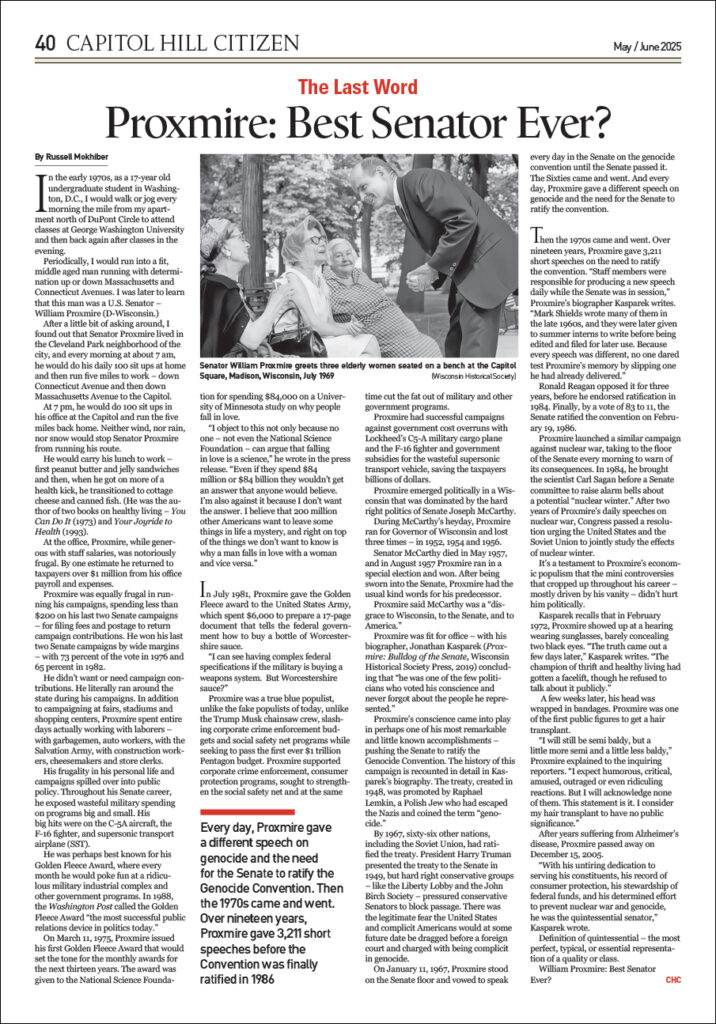William Proxmire: Best Senator Ever?
That’s a question raised in the current issue of the Capitol Hill Citizen (May/June 2025, page 40)
Senator Proxmire lived in the Cleveland Park neighborhood of the city, and every morning at about 7 am, he would do his daily 100 sit ups at home and then run five miles to work – down Connecticut Avenue and then down Massachusetts Avenue to the Capitol.
At 7 pm, he would do 100 sit ups in his office at the Capitol and run the five miles back home. Neither wind, nor rain, nor snow would stop Senator Proxmire from running his route. He would carry his lunch to work – f irst peanut butter and jelly sandwiches and then, when he got on more of a health kick, he transitioned to cottage cheese and canned fish. (He was the author of two books on healthy living – You Can Do It (1973) and Your Joyride to Health (1993).
At the office, Proxmire, while generous with staff salaries, was notoriously frugal. By one estimate he returned to taxpayers over $1 million from his office payroll and expenses. Proxmire was equally frugal in running his campaigns, spending less than $200 on his last two Senate campaigns – for filing fees and postage to return campaign contributions.
He won his last two Senate campaigns by wide margins – with 73 percent of the vote in 1976 and 65 percent in 1982. He didn’t want or need campaign contributions. He literally ran around the state during his campaigns.
In addition to campaigning at fairs, stadiums and shopping centers, Proxmire spent entire days actually working with laborers – with garbagemen, auto workers, with the Salvation Army, with construction workers, cheesemakers and store clerks.
His frugality in his personal life and campaigns spilled over into public policy. Throughout his Senate career, he exposed wasteful military spending on programs big and small.
His big hits were on the C-5A aircraft, the F-16 fighter, and supersonic transport airplane (SST).
He was perhaps best known for his Golden Fleece Award, where every month he would poke fun at a ridiculous military industrial complex and other government programs. In 1988, the Washington Post called the Golden Fleece Award “the most successful public relations device in politics today.”
On March 11, 1975, Proxmire issued his first Golden Fleece Award that would set the tone for the monthly awards for the next thirteen years. The award was given to the National Science Foundation for spending $84,000 on a University of Minnesota study on why people fall in love. “I object to this not only because no one – not even the National Science Foundation – can argue that falling in love is a science,” he wrote in the press release. “Even if they spend $84 million or $84 billion they wouldn’t get an answer that anyone would believe. I’m also against it because I don’t want the answer. I believe that 200 million other Americans want to leave some things in life a mystery, and right on top of the things we don’t want to know is why a man falls in love with a woman and vice versa.”
Proxmire was fit for office – with his biographer, Jonathan Kasparek (Proxmire: Bulldog of the Senate, Wisconsin Historical Society Press, 2019) concluding that “he was one of the few politicians who voted his conscience and never forgot about the people he represented.”
Proxmire’s conscience came into play in perhaps one of his most remarkable and little known accomplishments – pushing the Senate to ratify the Genocide Convention.
The history of this campaign is recounted in detail in Kasparek’s biography. The treaty, created in 1948, was promoted by Raphael Lemkin, a Polish Jew who had escaped the Nazis and coined the term “genocide.”
By 1967, sixty-six other nations, including the Soviet Union, had ratif ied the treaty. President Harry Truman presented the treaty to the Senate in 1949, but hard right conservative groups – like the Liberty Lobby and the John Birch Society – pressured conservative Senators to block passage.
There was the legitimate fear the United States and complicit Americans would at some future date be dragged before a foreign court and charged with being complicit in genocide.
On January 11, 1967, Proxmire stood on the Senate floor and vowed to speak the convention. “Staff members were responsible for producing a new speech daily while the Senate was in session,” Proxmire’s biographer Kasparek writes.
“Mark Shields wrote many of them in the late 1960s, and they were later given to summer interns to write before being edited and filed for later use. Because every speech was different, no one dared test Proxmire’s memory by slipping one he had already delivered.”
Ronald Reagan opposed it for three years, before he endorsed ratification in 1984. Finally, by a vote of 83 to 11, the Senate ratified the convention on February 19, 1986. Proxmire launched a similar campaign against nuclear war, taking to the floor of the Senate every morning to warn of its consequences.
In 1984, he brought the scientist Carl Sagan before a Senate committee to raise alarm bells about a potential “nuclear winter.” After two years of Proxmire’s daily speeches on nuclear war, Congress passed a resolution urging the United States and the Soviet Union to jointly study the effects of nuclear winter.
“With his untiring dedication to serving his constituents, his record of consumer protection, his stewardship of federal funds, and his determined effort to prevent nuclear war and genocide, he was the quintessential senator,” Kasparek wrote.
Definition of quintessential – the most perfect, typical, or essential representation of a quality or class.
William Proxmire: Best Senator Ever?
